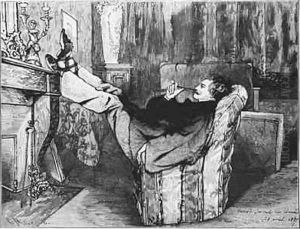Goncourt, Edmond de Paintings
Edmond de Goncourt, born Edmond Louis Antoine Huot de Goncourt on May 1822, was a French writer, literary critic, art critic, and a founder of the Académie Goncourt. He is best known for the journal he kept with his brother, Jules de Goncourt, which provides an intimate account of the French literary and artistic life in the latter half of the 19th century. Edmond came from a bourgeois background in Nancy, France, and was interested in literature and the arts from a young age.
Together with his brother Jules, Edmond embarked on a collaborative partnership that was to define both their lives. They co-authored several novels, often under the joint pseudonym Jules et Edmond de Goncourt. Their notable works include 'Germinie Lacerteux' (1864), 'Manette Salomon' (1867), and 'Madame Gervaisais' (1869). Their novels are characterized by a naturalistic style and an attention to detail, which aimed to portray the society and characters of their time with fidelity and psychological depth.
The brothers were also art critics and collectors, with a keen interest in 18th-century French art and society. They amassed a significant collection of art and artifacts from the period, which Edmond bequeathed to the French state upon his death.
After Jules's premature death in 1870, Edmond continued to write and maintain the journal they had started together. His later works include 'La Maison d'un artiste' (1881) and 'Chérie' (1884). One of Edmond's lasting contributions to French literature was the establishment of the Académie Goncourt, which he created in honor of his brother. The academy awards the Prix Goncourt, one of France's most prestigious literary prizes, to this day.
Edmond de Goncourt died on July 1896 in Champrosay, France. Despite being overshadowed by the more prominent literary figures of his time, the Goncourt brothers have left a lasting legacy through their detailed journal, their contribution to the naturalist literary movement, and the establishment of the Académie Goncourt, which continues to influence French literary culture.
